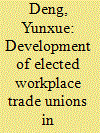| Srl | Item |
| 1 |
ID:
170981


|
|
|
|
|
| Summary/Abstract |
In an investigation of the development of elected workplace trade unions in the Guangzhou auto parts industry from 2011 to 2015, this article explores autoworkers' capacity to build associational power in authoritarian China. It finds that an unprecedented wave of strikes in 2010 pushed the regional trade union in Guangzhou into promoting workplace trade union reform, which opened a limited but important opportunity for autoworkers to participate in trade union affairs. Since then, autoworkers have learned to utilize the elected workplace trade unions' resources to forge collective demands and actions. The author argues that autoworkers in Guangzhou are building their associational power by penetrating and exercising partial control over the state-run trade union at the grassroots level. Compared to independent trade unionism in other newly industrialized countries, these autoworkers' unionization efforts are small scale, are less militant, and can be easily suppressed by a powerful local state and global capital. Despite this, they demonstrate the growing trade union consciousness and unionization efforts among autoworkers in South China
|
|
|
|
|
|
|
|
|
|
|
|
|
|
|
|
| 2 |
ID:
184749


|
|
|
|
|
| Summary/Abstract |
A study of autoworkers in Guangzhou, China found that Chinese workers successfully negotiated wages through collective bargaining. The emergence of collective bargaining comes from the triadic interaction among three conflicting agents: workers, local state and employers. The intention of the local state to shift labor-intensive industries towards more value-added industries and the tendency of the local police to avoid the use of violence have contributed to more political opportunities for the workers. To improve their own position and control labor unrest, regional unions form a vertical coalition with workers while autoworkers invoke their workplace bargaining power by engaging in strikes. At the same time, workers develop low risk strike strategies to reduce potential state suppression and employ anti-Japanese rhetoric to reduce pressure from management.
|
|
|
|
|
|
|
|
|
|
|
|
|
|
|
|